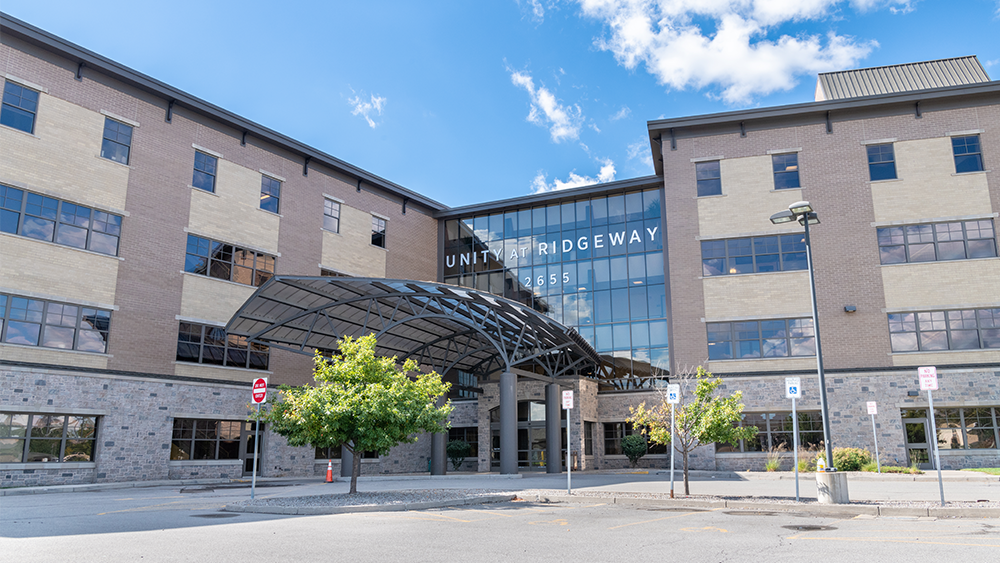


Patient Resources
One of the things that sets the Memory Center apart is the support we provide to both patients and families. Below is a list of resources that we hope you find helpful in preparing for the progression of dementia and developing positive coping strategies, as well as information on how to prepare for a patient's first visit.
Memory Center at Unity Program Brochure
Memory Center at Unity, New Patient Paperwork Form
Lifestyle and Activity Tips for Cognitive Health
Alzheimer's disease and dementia
- Alzheimer's Association (800) 272-3900
- Alzheimer's Disease Education and Referral Center
The ADEAR Center site provides current, comprehensive Alzheimer's disease information and resources from the U.S. Government's National Institute on Aging (NIA). - National Association of Area Agencies on Aging
- Eldercare Locator (800) 677-1116
- NYS Office of the Aging
- National Alliance for Caregiving (NAC)
The NAC is a non-profit coalition created to support family caregivers and the professionals who serve them. This website provides caregiving tips, publications, resources, a list of events and more. - National Family Caregivers Association (NFCA)
The NFCA supports family caregivers and speaks out publicly for caregivers' needs. It espouses a philosophy of self-advocacy and self-care that is predicated on the belief that caregivers who choose to take charge of their lives, and see caregiving as but one of its facets, are in a position to be happier and healthier individuals. - American Stroke Association (888) 478-7653
Corticobasal Degeneration and Progressive Supranuclear Palsy
- Society for Progressive Supranuclear Palsy (800) 457-4777
Frontotemporal Dementia
- The Association for Frontotemporal Dementias (866) 507-7222
- FRONTIER (Frontotemporal Dementia Research Group)
Lewy Body Dementia
- Lewy Body Dementia Association (800) 539-9767
Primary Progressive Aphasia/Progressive Non Fluent Aphasia/Semantic Dementia
- The Association for Frontotemporal Dementias (866) 507-7222
- National Aphasia Association (800) 922-4622
The Memory Center at Unity
At the Memory Center at Unity we recognize that for millions of people, cognitive and memory disorders are a part of every day life, and that they should be comprehensively addressed to help people live their healthiest and fullest life. We also understand that each case is uniquely different, and deserves the utmost attention and care. Our expert team of specially trained providers and nurses deliver personalized, comprehensive diagnostic assessment, treatment and support rooted in dignity, respect, independence, and choice. From highly trained neurologists, neuropsychologists, and nurses, to social workers, geriatricians, patients and families have access to advanced care teams with robust training in all areas of cognitive and memory care.
Memory loss does not have to be a loss of hope. Our highly specialized team provides comprehensive and compassionate care for neurodegenerative conditions affecting older adults and the aging nervous system. If you or your family are concerned about your memory or thinking skills, it may be time to visit the Memory Center.
Comprehensive Care for Memory Loss
Memory loss alone doesn’t always mean dementia. But if you or someone you care about is experiencing new or increased symptoms of memory loss or cognitive impairment that is interfering with their daily lives, it’s time to seek help.
Diagnosis
Many health conditions can cause symptoms of memory loss, which is why evaluation by an expert in memory disorders is crucial in arriving at an accurate diagnosis.
On the day of the patient’s first visit, they will meet with one of our cognitive and behavioral neurologists for approximately one hour, during which we will:
- Ask about the history or progression of their condition
- Assess memory, language, attention, balance and judgment capabilities
- Ask several focused questions to evaluate their current overall cognitive state
- Make referrals for diagnostic testing such as blood work, in-depth neuropsychological testing, an MRI, or PET scan, if necessary
Please bring any questions you may have for our team - this is an excellent time to talk through concerns and thoughts.
Treatment
Following a comprehensive evaluation and any follow-up testing, our clinicians will work together to customize a treatment plan that addresses the patients specific needs. Depending on the diagnosis, treatment options may include:
- Treating related conditions such as emotional or sleep disorders that can further compromise cognitive and memory abilities
- Developing an exercise plan that is suitable to promote brain health
- Nutritional evaluation to ensure the body and mind are getting the vitamins and minerals it needs
- Intellectual stimulation and memory training
- Physical, cognitive, and behavioral rehabilitation
- Psychotherapy/counseling/support groups to facilitate coping with changes in mood and overall functioning
- Social engagement
- Drug therapies and medication
And, because family members are just as deserving and in need of care, education, and support, we offer programs and services that are critical to the success of a patient’s treatment including patient and family support services for the social effects of illness.
Call the Memory Center Today(585) 723-7972 or browse our specialists
